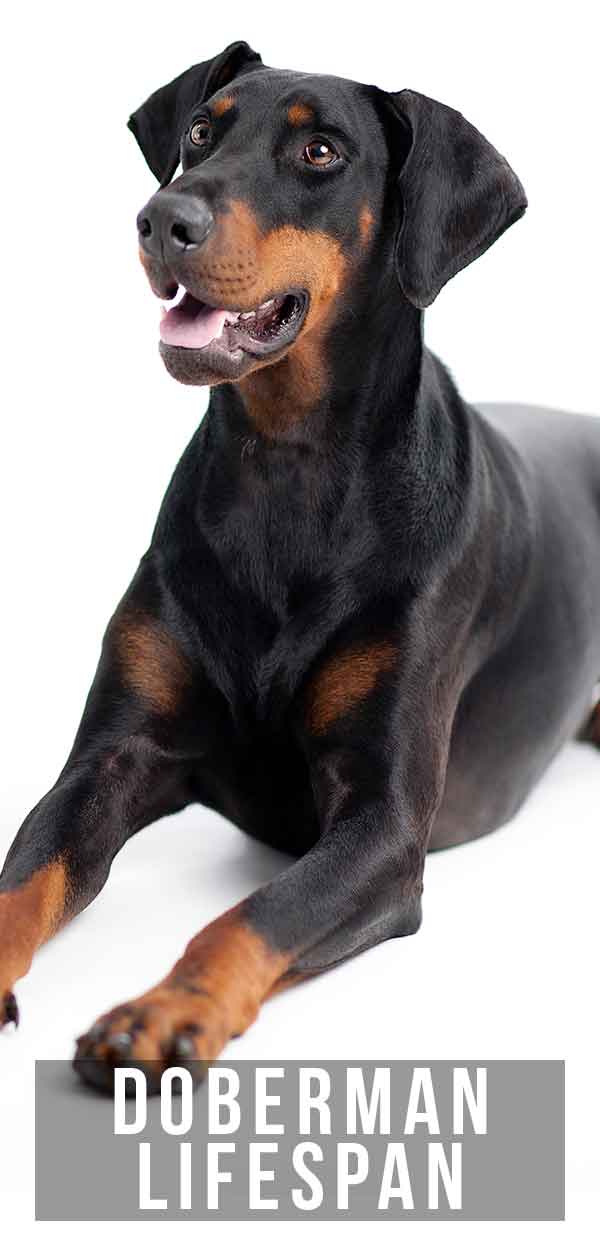[ad_1]

Scientific studies don’t always come to the same results when it comes to longevity, but we can be confident based on research that the average Doberman lifespan is somewhere between 9 and 11 years old. To help your dog live the longest possible time, buy a puppy from health tested parents, give them a nutritious diet and just the right amount of exercise.
Contents
- What the science says
- Lifespan limiting factors
- Buying and raising a healthy puppy
Doberman Lifespan Research
A UK survey of Doberman mortality in 2010 managed to collect data about the lifespan of 100 Doberman dogs. The median average lifespan of these pets was 10.5 years, and the longest living Doberman among them made it to a grand old age of 16.5.
A further dog mortality study performed in 2013 (also in the UK) included 37 Dobermans. They enjoyed a median average lifespan of 9.2 years. The longest surviving Doberman in the study lived to 13 years old.
Why the difference?
The 2010 study relied on Doberman owners self-reporting on their dogs’ health and lifespan, whereas the 2013 study secured direct access to the veterinary clinics’ records. Only 20% of the Doberman owners approached in 2010 returned the survey. Perhaps these owners were generally more conscientious about their dogs’ health in all respects.
This includes attending health checks and monitoring diet and exercise, as well as contributing to information requests from researchers for the benefit of all dogs. Their dogs might have enjoyed the benefit of that diligence, and achieved longer average lifetimes as a result.

Do Larger Dogs Die Younger?
It has been repeatedly observed that large, giant breeds live much shorter lives on average when compared with smaller breeds. You could make an argument for this applying to the Doberman too. Standing at 24-28 inches tall, they are certainly a big dog, and their lifespan is slightly shorter than a lot of smaller dogs.
One 2006 study into this phenomenon concluded that it is most likely the result of artificial selection for extremely high growth rates in large breeds.
This may have increased the risk of severe developmental disorders which impact life expectancy.
This raises a good point. Dogs naturally were never meant to reach this size, and it is only with human influence have such giant dog breeds been achieved. Larger dogs are more prone to developmental disease due to this, so it certainly is a factor.
Another study, published in 2013, came to the conclusion that the shorter lifespan is a result of larger dogs actually tending to age quicker than smaller breeds.
These two factors together are most likely the cause of the shortened lifespan we see in giant breeds, and to some extent, in the Doberman. However, one more factor could be the severe health issues that this breed is predisposed to.
Doberman Health Risks
Unfortunately, the Doberman is at an increased risk for some severe health conditions that may very well cut their life short. A big killer of deep-chested dogs, including the Doberman, is a condition called bloat.
When a dog is experiencing bloat, their stomach will fill with gas and then twist, cutting off the blood supply to the digestive system while simultaneously impeding blood from returning to the heart.
The lack of blood supply leads to cell death and toxins being released into the bloodstream. It has a sudden onset and can be fatal in just a few hours.
Dilated Cardiomyopathy
Another serious condition that can lead to a short life in the Doberman is a heart disease known as dilated cardiomyopathy. This condition is characterized by an enlarged heart that is unable to pump blood efficiently.
It is a progressive condition that can eventually lead to congestive heart failure.
Von Willebrand’s Disease
Finally, von Willebrand’s disease is an incurable condition that can be prevalent within Dobermans. This is where the blood struggles to clot and can lead to minor abrasions or cuts bleeding heavily without end.
Spontaneous bleeding from the mouth and nose can also occur.
Buying Healthy Puppies
Some of the health conditions we outlined above have a genetic basis, and with good breeding practices, they can be avoided.
Breeding Dobermans should undergo health screening before having puppies. Ask your breeder for evidence of good hip scores, and clear tests for heart disease, von Willebrand’s and autoimmune thryoiditis. If the parents are clear then the puppies can’t inherit these conditions.

Diet Impacts Lifespan
A well-balanced and nutritious diet can go a long way in promoting good health in your Doberman. It is especially important during their time as puppies. Since they grow quickly, it is imperative that you fulfil their daily nutritional needs so they develop correctly.
The amount of food you give is also important to think about! Obesity can be a real problem in dogs and can have a significant impact on their life expectancy.
Fulfilling Their Exercise And Grooming Needs
Dobermans are incredibly athletic and energetic dogs that need a lot of daily exercise to be happy.
Sufficient exercise keeps their bodies fit and minds stimulated, which can go a long way in keeping them strong and healthy.
Grooming For Health
While this breed does not need much in the way of grooming, it’s still an important aspect. Good hygiene can help protect against infection and irritation.
[ad_2]
Source by [author_name]



